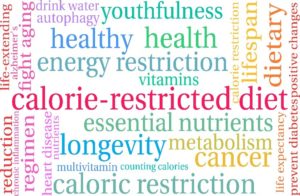Chasing Longevity with Research
In an ongoing effort to chase longevity I am continually reading and listening to various qualified media to learn more and to also stay up with the latest information since it seems to always be changing. This is what led me to things like the Keto diet and intermittent fasting. While learning more about fasting, I kept running into a process in the body at the cellular level known as autophagy.
What is Autophagy?

Autophagy is the body’s way of cleaning out damaged cells [1], in order to regenerate newer, healthier cells, according to Priya Khorana, PhD, in nutrition education from Columbia University.
Autophagy is an evolutionary self-preservation mechanism [1] through which the body can remove the dysfunctional cells and recycle parts of them toward cellular repair and cleaning, according to board-certified cardiologist, Dr. Luiza Petre.
Petre explains that the purpose of autophagy is to remove debris and self-regulate back to optimal smooth function.
“It is recycling and cleaning at the same time [1], just like hitting a reset button to your body. Plus, it promotes survival and adaptation as a response to various stressors and toxins accumulated in our cells,” she adds.
Indeed, the pharmacological or genetic inhibition of autophagy [2] generally limits the ability of cells to cope with stress and restore homeostasis.
So, what if you could do something that would promote this? Well there is. And it’s called fasting.
Fasting to Promote Autophagy
Note: Before we go any further. Know that all of the studies sited have been on non-human animals. Researchers are working towards being able to do studies on humans but that has not happened yet. (My opinion: one roadblock may be that it would be difficult to get a large amount of people to be compliant with fasting for a long enough of a period of time).
A 2018 review of the existing research [3] strongly suggests that both fasting and calorie restriction can induce autophagy.
Although there is some evidence of this process occurring in humans, most of these studies involved non-human animals.
Fasting and calorie restriction puts the body’s cells under stress. When a person limits the amount of food that goes into their body, their cells receive fewer calories than they need to function correctly.
When this happens, the cells must work more efficiently. In response to the stress brought on by fasting or calorie restriction, autophagy causes the body’s cells to clean out and recycle any unnecessary or damaged parts.
Scientists are unsure about which cells respond to fasting and calorie restriction in this way, however. People trying to induce autophagy by fasting should be aware that this may not target fat cells, for example.
Research on Autophagy in Brain Cells
Researchers are still debating whether fasting can induce autophagy in the brain. At least one animal study suggests that short term fasting can induce autophagy in brain cells.
Summarizing an article published on tandfonline.com [4], researchers stated that:
Disruption of autophagy can cause neurodegenerative disease, and the converse also may hold true: upregulation of autophagy may have a neuroprotective effect. it has been suggested that intermittent fasting might improve neuronal function by means that are entirely independent of caloric intake, and may instead reflect an intrinsic neuronal response that is triggered by fasting; we speculate that the reported improvement of neuronal function may be related to the upregulation of autophagy that we show.
And in another article published by the NIH [5], researchers concluded that:
“Based on the existing evidence from animal and human studies described, we conclude that there is great potential for lifestyles that incorporate periodic fasting during adult life to promote optimal health and reduce the risk of many chronic diseases, particularly for those who are overweight and sedentary. Animal studies have documented robust and replicable effects of fasting on health indicators including greater insulin sensitivity, and reduced levels of blood pressure, body fat, IGF-I, insulin, glucose, atherogenic lipids and inflammation. Fasting regimens can ameliorate disease processes and improve functional outcome in animal models of disorders that include myocardial infarction, diabetes, stroke, AD and PD. One general mechanism of action of fasting is that it triggers adaptive cellular stress responses, which result in an enhanced ability to cope with more severe stress and counteract disease processes. In addition, by protecting cells from DNA damage, suppressing cell growth and enhancing apoptosis of damaged cells, fasting could retard and/or prevent the formation and growth of cancers.“
Certainly, more research needs to be done. But so far, the results are promising. And what harm would it do to fast occasionally. Fasting is also known to be a good way to regulate your weight, glucose levels and enhance mood, thinking and metabolism [6].
[2] https://www.ncbi.nlm.nih.gov/pmc/articles/PMC4388596/
[3] https://www.medicalnewstoday.com/articles/autophagy
[4] https://www.tandfonline.com/doi/pdf/10.4161/auto.6.6.12376?needAccess=true&
[5] https://www.ncbi.nlm.nih.gov/pmc/articles/PMC3946160/
[6] https://www.floridamedicalclinic.com/blog/benefits-of-fasting/